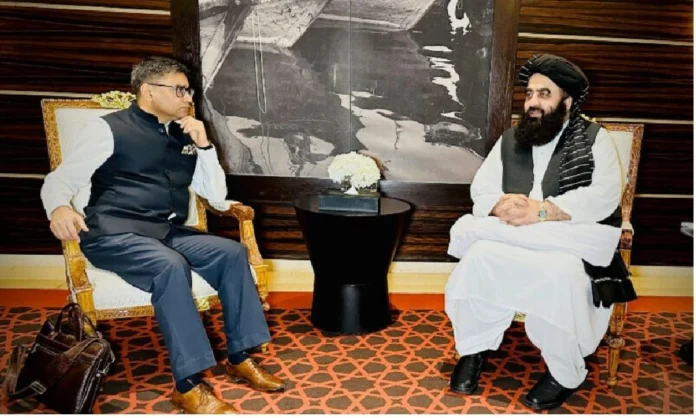By Annunthra Rangan
In a major diplomatic development, India has officially been referred to as a “strategic regional and economic partner” by the Taliban following a high-level meeting between Indian Foreign Secretary Vikram Misri and Afghanistan’s acting Foreign Minister Amir Khan Muttaqi in Dubai. The talks, the most significant engagement between the two sides since the Taliban’s return to power in 2021, focused on trade via the Chabahar Port in Iran, refugee rehabilitation, and boosting Afghanistan’s ailing healthcare sector.
This move reflects India’s pragmatic recalibration of its Afghanistan policy amidst the complex dynamics of regional geopolitics, balancing its historical stance against the Taliban’s radical ideology with the necessity of maintaining influence in the war-torn nation.
Key Agenda: Chabahar Port And Trade Cooperation
At the heart of the discussions was the Chabahar Port, a key infrastructure project India has been promoting to bypass Pakistan-controlled trade routes. The port provides India with direct access to Afghanistan and Central Asia, enabling uninterrupted movement of goods and humanitarian aid. The Taliban reaffirmed its commitment to fostering political and economic ties with India, describing the country as “a crucial regional and economic partner” under Afghanistan’s new “balanced and economy-driven foreign policy”.
For New Delhi, the Chabahar Port is not just a trade asset, but also a strategic countermeasure against China’s Belt and Road Initiative (BRI), which threatens to undermine India’s influence in Afghanistan and Central Asia. The Taliban’s growing tensions with Pakistan, once its principal backer, have further opened avenues for India to step in as a stabilizing force in the region.
India’s Humanitarian Focus: Refugees and Healthcare
The discussions also centred on addressing Afghanistan’s burgeoning humanitarian crisis, exacerbated by the forced repatriation of nearly one million Afghan refugees from Pakistan and Iran since late 2023. India announced plans to provide material aid to support the reintegration of these refugees into Afghan society, with immediate assistance focused on the health sector. Afghan officials confirmed that land distribution for returning refugees is already underway.
India’s role as a humanitarian partner has grown significantly in recent years. In addition to its commitment to refugee rehabilitation, New Delhi has delivered multiple consignments of aid, including wheat, medicines, Covid-19 vaccines, and winter clothing, to Afghanistan since the Taliban’s return to power. These efforts underscore India’s long-standing reputation as a trusted ally to the Afghan people.
Diplomatic History: From Estrangement to Engagement
India’s relationship with the Taliban has historically been fraught with tension. When the Taliban first took control of Kabul in 1996, India severed diplomatic ties, citing the group’s hardline interpretations of Islamic law and Afghan traditions. After the US-led invasion ousted the Taliban in 2001, India emerged as a major supporter of Afghanistan’s democratic governments, providing nearly $3 billion in aid over two decades.
India’s investments during this period included the construction of Afghanistan’s parliament building, highways, dams, and power plants, as well as educational and skill development programmes. These efforts enhanced India’s soft power and fostered goodwill among Afghan citizens. However, the Taliban’s resurgence in 2021 forced New Delhi to reassess its strategy.
In 2022, less than a year after the Taliban’s return to power, India reopened its embassy in Kabul with a team of “technical experts” to oversee humanitarian initiatives. This cautious engagement reflects India’s recognition of Afghanistan’s strategic importance and the need to maintain a presence in the country despite its ideological differences with the Taliban.
Pakistan’s Waning Influence
Conventional wisdom once held that the Taliban’s return to power would bolster Pakistan’s influence in Afghanistan, providing Islamabad with strategic depth against India. However, this assumption has been upended. Relations between the Taliban and Pakistan have soured significantly, marked by cross-border clashes and retaliatory strikes.
On December 24, the Pakistan Air Force conducted strikes on Tehreek-e-Taliban Pakistan (TTP) hideouts in Afghanistan’s Paktika province. While Islamabad claimed the strikes targeted militants, the Taliban countered that the attacks killed 46 civilians, including women and children. The Taliban’s retaliatory strikes and condemnation of Pakistan’s actions have further strained relations between the two neighbours.
Amid this backdrop, India’s engagement with the Taliban serves as a strategic move to counter Pakistan’s destabilizing influence while reinforcing its position as a reliable regional partner.
China’s Growing Role and The BRI Challenge
China’s growing footprint in Afghanistan presents another challenge for India. With the United States and Europe scaling back their involvement, Beijing has sought to fill the void through its Belt and Road Initiative, potentially extending the project into Afghanistan. This move could undermine India’s efforts to leverage the Chabahar Port and the International North-South Transport Corridor for trade with Central Asia.
India’s renewed focus on Afghanistan reflects its understanding of these shifting dynamics. By engaging with the Taliban, New Delhi aims to safeguard its investments, counterbalance China’s influence, and reaffirm its commitment to the Afghan people.
A Balancing Act
Despite its pragmatic approach, India faces challenges in maintaining a cohesive policy on Afghanistan. Analysts warn that India’s steadfast support for former leaders like Hamid Karzai and Ashraf Ghani may have limited its ability to engage with a broader spectrum of Afghan stakeholders, including those aligned with the Taliban.
As regional dynamics evolve, India’s engagement with the Taliban is a calculated risk aimed at preserving its strategic interests. The recent talks mark a significant step in this direction, with both sides expressing a willingness to strengthen trade and humanitarian cooperation.
Future Outlook
The path ahead remains uncertain. Will India collaborate with the United States to shape Afghanistan’s future? How will China and Pakistan respond to India’s renewed engagement with the Taliban?
For now, India’s approach underscores its recognition that Afghanistan cannot be ignored. By keeping channels open with the Taliban, New Delhi hopes to navigate the complexities of regional geopolitics, safeguard its strategic investments, and continue its legacy as a trusted partner to the Afghan people.
—The writer is a Senior Research Officer at Chennai Centre for China Studies. Her research interests constitute China-WANA (West Asia and North Africa) relations and human rights


